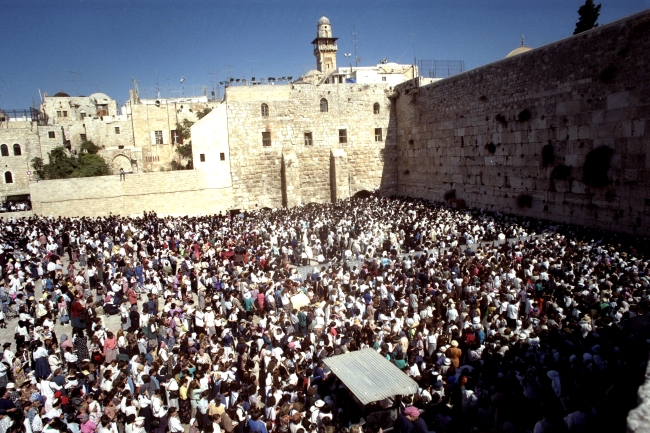7. Prayer and the Priests’ Blessing – Tefillah u-Birkas Kohanim
a) Prayers
We are commanded to pray every day, as it says “And you shall serve Ha-Shem your G-d”1; this service refers to prayer, as it says “And to serve Him with all your heart” — “What is service in the heart? It is prayer”.2,a
Times and forms of prayers were not fixed by the Torah; Ezra and his court instituted the Eighteen Benedictions (shemoneh esreh).b They also established that the number of daily services should be the same as that of the communal sacrifices: morning and afternoon services corresponding to the morning and afternoon sacrifices; an additional service on sabbaths, new moons, and festivals corresponding to the additional sacrifice; and an additional service on certain fast days just before sunset. It has become a universal custom to recite an evening prayer corresponding to the parts of the sacrifices that burn on the altar all night.c The morning prayer should be said between sunrise and the end of the first third of the day (or if necessary, between dawn and noon); the afternoon prayer, between 19/24 and 43/48 of the day (or if necessary, between 13/24 and sunset); the additional prayer, between the morning prayer and 7/12 of the day (or if necessary, until sunset); the evening prayer, between nightfall and dawn (or if necessary, even somewhat before sunset).d If possible these prayers should be recited standing and facing toward the Holy of Holies in the Temple in Jerusalem.e In addition, the sages instituted benedictions to be recited every day upon arising and upon retiring.f One should also recite the benedictions over Torah study each day and then read passages from the Torah and Mishnah [and Midrash]; and one should read selections from Psalms (including Chs. 145-150) preceded and followed by the appropriate benedictions.g These recitations begin the morning service; they are followed by the shema and its benedictions, the shemoneh esreh, penitential prayers (tachanun), and Psalm 145 (ashrei). The afternoon service consists of ashrei, the shemoneh esreh, and tachanun; the evening service, of the shema and its benedictions followed by the shemoneh esreh.h One should recite 100 benedictions every day; on the sabbath and festivals, when the shemoneh esreh consists of only seven benedictions (nine, in the additional service for Rosh ha-Shanah), these must be made up by reciting many benedictions over food.i
b) Prayer with a Congregation; the Synagogue
A person should not pray alone if he can pray with a congregationj; certain prayers of sanctification (kaddish, kedushah), as well as the priests’ blessing and the readings from the Torah and prophets (see below), require the presence of at least ten adult males.k A qualified representative (the “messenger of the congregation”) reads the prayers aloud (except for the evening shemoneh esreh since it is not obligatory).l
Every community of ten or more must set aside a house in which to gather for prayers; it is called a synagogue (lit. “house of assembly”). It should contain an ark for the Torah scroll, before which the messenger of the congregation stands, and a platform in the center from which the Torah is read. A person must behave with respect while in a synagogue.m
c) Torah Readings
Moses and Ezra instituted public Torah readings every Monday, Thursday, and sabbath, as well as on new moons, Chanukah, Purim, fasts, and festivals, after the morning service (but before the second recitation of ashrei); and also before the afternoon service (but after ashrei) on the sabbath, fasts, and Yom Kippur.n At each of these, three or more men are called on to read at least three verses each, preceded and followed by the appropriate benedictions.o If possible, the first two men called should be a priest and a Levite.p On sabbaths, fasts and holidays a section from the Prophets is read after the Torah reading, preceded and followed by the appropriate benedictions.q
The sabbath morning readings cover the entire Torah in one year, beginning on the sabbath after Sukkos and ending on the last day of Sukkos. Everyone must read this weekly portion for himself each week whether or not he hears it read in the congregation. On Monday and Thursday mornings and on sabbath afternoons the first part (at least ten verses) of the coming sabbath morning’s portion is read.r On all other occasions a portion appropriate to the occasion is read.s On four sabbaths preceding Pesach additional portions are read concerning the Temple tax, the misdeeds of Amalek, the Red Cow, and Pesach.t
d) The Priests’ Blessing
The priests are commanded to bless Israel, as it says “Thus shall you bless the children of Israel…”.3,u In the Temple they recite this blessing daily after the daily morning sacrifice; elsewhere, just before the messenger of the congregation reads the last benediction of the shemoneh esreh.v
Sources: |
|
| 1. Ex. 23:25 | a. 1:1 |
| 2. Deut. 11:13 and Sifrei on it; Taanis 2a | b. 1:1,4 |
| 3. Num. 6:22ff. | c. 1:5-7 |
| d. 3:1,2,4-7 | |
| e. 5:1 | |
| f. 7:1ff.,3ff. | |
| g. 7:11-12 | |
| h. 7:17-18 | |
| i. 7:14-16 | |
| j. 8:1 | |
| k. 8:4-6 | |
| l. 8:4,11; 9:1ff.; 9:9 | |
| m. 11:1-5 | |
| n. 12:1-2,20-22 | |
| o. 12:3,5 | |
| p. 12:18-19 | |
| q. 12:2,15 | |
| r. 13:1,3,12,25 | |
| s. 13:4,8-13,16-18 | |
| t. 13:20 | |
| u. See 14:11;15:6-7 | |
| v. 14:9,3 | |


